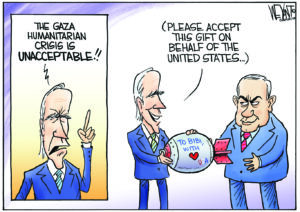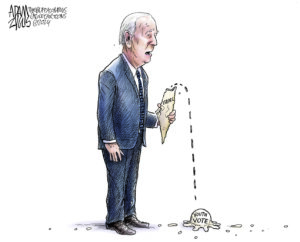Israel Shuts Down Crucial Gaza Cargo Crossing
Critics warn the closure could spark a humanitarian crisis. Palestinian fishing boats sail into the waters of the Mediterranean Sea in Gaza City. (Adel Hana / AP)
Palestinian fishing boats sail into the waters of the Mediterranean Sea in Gaza City. (Adel Hana / AP)
In a move condemned by human rights advocates as another of the Israeli government’s “genocidal policies of collective punishment” in Gaza, Israel has announced stringent new import rules for the territory’s main cargo crossing.
As Israel and Egypt have maintained a naval, aerial, and land blockade of the occupied territory for more than a decade, the Kerem Shalom crossing is how most commercial goods and foreign aid reach Gazans. Under the new restrictions, only food, medicine, and “humanitarian equipment” can come through the entry point.
The rules, Al Jazeera said, “will also affect Gaza’s exports, further straining an already crippled economy brought to its knees by the 12-year blockade.”
While the Israeli government claims the closure is aimed at curtailing militant activity in Gaza, human rights advocates such as Omar Shakir, the Israel and Palestine director for Human Rights Watch, condemned the border closure as just the latest example of Israel’s “unlawful collective punishment” against the people imprisoned within the Gaza Strip.
No pretense: Israel openly acknowledges its unlawful motive in closing Gaza’s lone commercial crossing for 2 million Palestinians over the actions of small group. Unlawful collective punishment is Israel’s go-to tactic. https://t.co/6IofQvCzdY pic.twitter.com/h1dnSUhh3q
— Omar Shakir (@OmarSShakir) July 10, 2018
Palestinian-American journalist Ali Abunimah said on Twitter that the restrictions are among Israel’s “genocidal policies,” and emphasized that all other nations which back Israel should be held to account for the consequences of the closure:
Israel’s total ban on imports and exports from Gaza ghetto, and further restrictions on fishing are genocidal policies of collective punishment. But blame not on Israel alone. All @EUinIsrael /other states that aid and support this murderous regime are responsible for this crime.
— Ali Abunimah (@AliAbunimah) July 9, 2018
The Hamas government in Gaza denounced the move as “a new Israeli crime against humanity.”
Israeli Prime Minister Benjamin Netanyahu said Monday that “the Defense Minister and I agree that we will be heavy-handed with the Hamas regime in the Gaza Strip—immediately.”
Beyond the import rules, Netanyahu said, “there will be additional steps; I will not go into details.” Although he did not divulge whether such steps would include ending the recent expansion of Gaza’s fishing zone from six to nine nautical miles, which took effect nearly three months ago, according to Reuters, an Israeli military statement declared the fishing zone would revert to the lower limit.
Though frustrating for Gaza’s fisherman, who still struggle within the confines of the expanded zone, the decision was not surprising. While Israel occasionally allows such expansions to boost the Gazan economy, they typically only last for three months. Ahead of that statement, Nizar Ayash, the leader of Gaza’s fishermen’s union, had told Al Jazeera that members would be taking precautions.
“The latest retaliatory measure by Israel made no mention to the fishing limit in Gaza, but we expect to hear from them on Tuesday,” Ayash had said. “The three-month mark is about to end anyway… So we will be back to fishing at only six nautical miles soon.”
Your support matters…Independent journalism is under threat and overshadowed by heavily funded mainstream media.
You can help level the playing field. Become a member.
Your tax-deductible contribution keeps us digging beneath the headlines to give you thought-provoking, investigative reporting and analysis that unearths what's really happening- without compromise.
Give today to support our courageous, independent journalists.






You need to be a supporter to comment.
There are currently no responses to this article.
Be the first to respond.